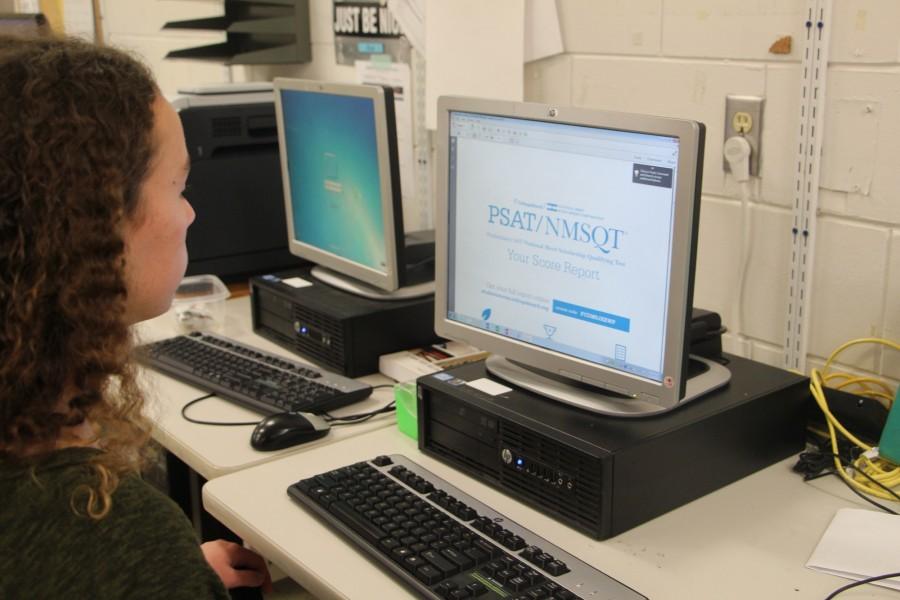Debunking the Myths: Behind the PSAT Scores
Photo I. Hanewicz
When looking at your PSAT score report, make sure you understand the results.
January 7, 2016
At 8 a.m. Jan. 7, PSAT scores were released to students using the College Board’s website, the first wave of results from a newly redesigned suite of College Board testing. Not only did the PSAT itself change, the way PSAT scores are reported changed as well.
When looking at a PSAT score report- an example score report provided by the college board is here- it is easy to be overwhelmed. We talked to IB Guidance Counselor Erika George in order to clear up common misconceptions about PSAT scores, especially due to the changes in the PSAT.
MYTH: You can compare this year’s PSAT scores to previous ones.
FACT: The PSAT changed significantly from 2014 to 2015. In scoring, the new PSAT has two sections, Evidence-Based Reading and Writing and Math, whereas the old PSAT had three: reading, writing and math. In addition, there is no longer a penalty for wrong answers. The reading test now includes more evidence-based reading, and in the writing section, students are asked to correct sentences directly from the passage. Math skills were changed to align to new College Board standards which use math skills students are more likely to use in life. Vocabulary is more context-based and relies less on information. Because of this, it is hard to truly compare scores from the two tests, even if you use a scoring convertor tool, because different material is tested.
MYTH: You can look at your PSAT scores and determine whether you met National Merit Scholar requirements.
FACT: The only people who know for certain they didn’t receive National Merit Scholarships are freshmen and sophomores- only juniors are eligible. While your PSAT score report will show a National Merit Selection Index, you can’t tell what that index means quite yet. Even if you look at the 2015 cutoffs and your index exceeds that score, it doesn’t mean anything for 2016. While scoring in a high percentile certainly will increase your chances of becoming a National Merit Semifinalist, it has no significance as of yet.
“The number for the National Merit score will come out next fall for the juniors, and that number can change every year,” George said. “[For 2015] we didn’t get the official number in, but we think it was a 213.”
For students who scored higher than a 213 in the selection index, George said they would likely meet the cutoff, however, scores can vary year by year and National Merit Scholars won’t be announced officially until late September 2016.
“We will know in about a month or two who is a Commended student, which means people from that group will be a part of [National Merit]. Right now, we just have no idea,” she said. “Depending on how people do, it could be a lower number, like a 210. It just depends on how people in Florida do.”
MYTH: Colleges will see your PSAT scores.
FACT: Colleges will not receive your PSAT scores, and even if you wanted to send your scores to colleges, they do not accept them. The only thing colleges recognize is National Merit Scholars or Commended Students, which indicate a student received a score which fell in the top 1%. Still, Merit Scholars and Commended Students don’t submit their exact PSAT scores to colleges.
“The only people who will see [PSAT scores] will be the student, the parents if they see it, and then the school. It won’t effect anything for placement or anything like that,” George said.
MYTH: If you did poorly on the PSAT, you won’t perform well on the new SAT.
FACT: The PSAT is a benchmark, but just because you did worse than you’d hoped on it doesn’t mean you can’t improve in time for the SAT. For juniors who take the free in-school SAT on March 2, there are almost two months to improve their score. Students can analyze their score report and see the exact category of the questions they missed as well as review the questions on the College Board’s site. Khan Academy offers students personalized practice based on their PSAT scores for those looking to improve.
For students disappointed by their PSAT scores, Sugar recommended they not stress, as the SAT and ACT are the scores with impact on the college admissions process.
“Put the PSAT behind [you] and just do some SAT prep or ACT prep for the actual, official SAT and ACT.”

























